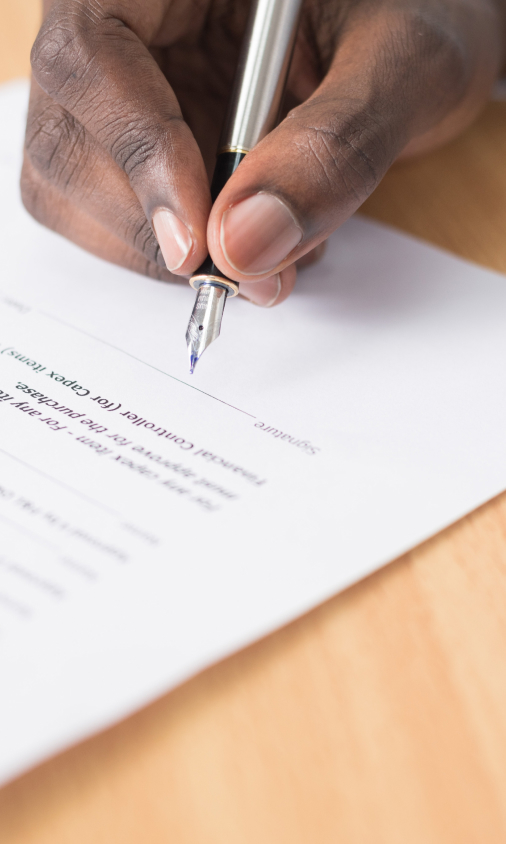
Online divorce is one of the ways to prepare divorce paperwork without an attorney. It is usually a good match for couples who don’t have disputes over divorce terms, such as property division or alimony.
How does it work?
Divorcing couples need to register and answer several questions about their desired divorce terms. They will also need to provide some basic personal information.
Then, the system will help them select the packet of appropriate New Jersey divorce forms and easily complete them. Finally, the papers in PDF format and filing guide will be available for spouses in only two business days.
People use the online divorce option because:
Contested Divorce
Online Divorce $299
DIY Divorce

Spouses who want to start a marriage dissolution process need to collect the following forms:
Note that there could be other forms that spouses need to file with the court and those that don’t apply. For instance, the Request for Waiver of Fees is only filed when a plaintiff cannot afford to pay the filing fees.

Blank forms for NJ divorce can be found at the county courts’ official resources or obtained from the clerk’s office. Unfortunately, they will not be free of charge most of the time.
Another more convenient option is to use the CompleteCase.com service and obtain the packet of all required documents online.
Those who fill out the forms without any help or legal advice from a lawyer should follow certain rules described below.
If the documentation is completed with mistakes, the court clerk will reject them and return the entire packet to the plaintiff.
To avoid such an unpleasant situation, the couples can prepare their paperwork with CompleteCase.com. This service will assist them with collecting and filling out the forms according to New Jersey state standards.
The process is simple and quick. After a person registers and answers an online questionnaire, they can download and print all the completed forms in just two days.
New Jersey divorce includes several key stages that a couple must complete.
Grounds for Divorce
Initial Filing
Court Fees
Serving a Spouse
Finalizing a Divorce
Grounds for Divorce
New Jersey State Laws require any person who wants to separate from their spouse to indicate a reason for this action. They can choose one of nine reasons, also called grounds.
New Jersey courts allow divorce on either fault or no-fault grounds.
A no-fault option was introduced in 2007 and made it possible to end a marriage without publicly accusing any spouse of a marriage breakdown. Since then, the couples can choose the “irreconcilable differences” or “separation for 18 months” as no-fault reasons to end a marriage.
As a rule, spouses filing for a no-fault divorce resolve all disputes outside the court. They should discuss property division, child custody and support, alimony, and other issues. If both parties agree to the terms, they conclude a settlement agreement and file it with other papers.
The fault-based grounds are used for contested divorces. They include:
Initial Filing
Initial documents to file with the court include a Complaint about Divorce/Dissolution and an Attached Certification form, Certification of Insurance, and several other forms depending on the circumstances. If the filings are successful, the court will return a copy of the papers with the word “filed” and the docket number.
Court Fees
Before filing papers, the petitioner must pay the filing fees. The fee schedule may vary between counties. On average, the processing of documents costs $300. In addition, all couples with children must pay $25 for a parenting educational program.
Serving a Spouse
A filing spouse must tell the other party about the divorce proceedings no later than 4 months after filing divorce documents with the court. There are three ways to serve the other spouse:
Finalizing a Divorce
The clerk will schedule a court hearing when all papers have been filed. It usually takes place within 30 days. The petitioner should also prepare a consent order form and bring it to the hearing. The judge will sign the divorce decree if all the issues are addressed and the documents are filled out correctly.

Family law attorneys usually help divorcees with the paperwork, discovery process, filings with the court, and serving the other spouse. In addition, they represent their client in a family court.
However, lawyers’ services are very costly. An average New Jersey attorney charges $200-$500 an hour, contributing to mounting divorce expenses. Luckily, not all couples need legal representation.
Uncontested cases where the spouses resolve their differences peacefully don’t usually require a divorce lawyer. These couples may proceed without an attorney if they:
When the spouses do not hire attorneys, they have to take care of the paperwork and filing process independently. In other words, they go with a DIY method. It’s usually more affordable than the traditional way but not always faster since not everyone is comfortable doing all the paperwork without help.
Couples with a DIY divorce can make document preparation much easier if they use the help of CompleteCase.com. This service will provide them with all the paperwork fast and stress-free.

Child Custody
In every divorce involving minor children, the final decree should contain decisions about child custody. Namely, it includes the place and parent where the kids will live after divorce and who will be responsible for their upbringing. Typically, spouses with amicable divorce should add all those terms into their parenting plan.
Thus, New Jersey courts consider two types of custody: physical and legal. Each of them can be sole or joint.
Sole physical custody means that a child lives permanently with one parent, while the other might have visitation rights.
Joint physical custody grants both parents the right to live with the child according to an agreed schedule.
Sole legal custody means that only a custodial parent can make important decisions about the child, e.g., education, healthcare, etc.
Joint legal custody, on the contrary, allows both parents to make decisions concerning the child’s well-being.
When the judges assign the custody type, they consider:
Child Support
The child’s parents are responsible for supporting their children financially until they reach 19 years of age. The amount of this usually periodic payment is determined with the help of the state’s child support guidelines. They use such parameters as each parent’s income and the number of children.
There is no established waiting period between the filing date and the court hearing where a judge issues a final judgment regarding the divorce case. Typically, this hearing is scheduled within 30 days after the respondent files an answer or acknowledgment of service.
However, there are several waiting periods for different grounds alleged in the complaint. For example, if the couple states that their marriage broke down because of irreconcilable differences, this situation needs to be going on for six months before they file the petition.
To shorten the time needed for marriage dissolution, the spouse should:
When any person wants to dissolve their marriage, they need to check if they meet the state residency requirements. Usually, it’s a certain number of days that either spouse must live within the state’s borders.
New Jersey’s residency requirements are as follows:

How long will it take in New Jersey?
If the decision to get divorced is mutual, the spouses can file for a no-fault divorce, which will take less than three months to finalize. However, couples with unresolved disputes might spend six months to a year in court on average.
Can I get a free divorce in New Jersey?
If a filing spouse’s low income does not allow them to pay the court fees, the judge can waive this payment. To ask for a waiver, the plaintiff must file a Request for a Fee Waiver with the trial court.
How to file for divorce in New Jersey?
To ask the court for divorce, a person must complete a Complaint about Divorce form and pay the filing fees (or file a fee waiver) with the clerk in the local court.
How much does a divorce cost in New Jersey?
The starting price to get a divorce in New Jersey is $300, which is a filing fee paid at the court clerk’s office.
Our Customer Commitment